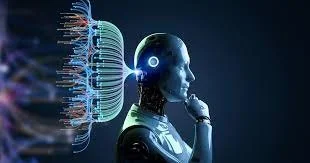Understanding the Power of AI: A Deep Dive
Introduction
Artificial Intelligence (AI) is no longer a futuristic fantasy; it's a reality that's rapidly transforming our world. From the moment you unlock your phone with facial recognition to the personalized recommendations you receive on streaming services, AI is quietly but profoundly impacting every aspect of our lives. This article delves into the core concepts of AI, explores its diverse applications, and examines the profound impact it is having on society.
What is Artificial Intelligence?
At its core, AI refers to the development of computer systems capable of performing tasks that typically require
- Learning: Acquiring new information and rules for using that information.
- Reasoning: Using rules to reach conclusions.
- Problem-solving: Finding solutions to complex challenges.
- Perception: Interpreting sensory information from the real world.
- Natural Language Understanding: Communicating and understanding human language.
Key Types of AI
- Narrow or Weak AI: Designed for specific tasks, such as playing chess, powering virtual assistants (like Siri or Alexa), and recommending products online.
- General or Strong AI: Hypothetical AI with human-level intelligence, capable of understanding, learning, and applying knowledge across various domains.
- Super AI: A hypothetical AI surpassing human intelligence in all aspects, possessing consciousness, and potentially posing existential risks.
Key Concepts in AI
- Machine Learning: A subset of AI that enables systems to learn from data without explicit programming. This involves algorithms that can identify patterns, make predictions, and improve their performance over time.
- Deep Learning: A subfield of machine learning that utilizes artificial neural networks with multiple layers to analyze complex data, such as images, text, and sound.
- Natural Language Processing (NLP): The ability of computers to understand, interpret, and generate human language. This includes tasks like translation, sentiment analysis, and chatbots.
- Computer Vision: Enables computers to "see" and interpret images and videos, enabling applications like facial recognition, object detection, and self-driving cars.
Applications of AI
AI is revolutionizing countless industries and aspects of our daily lives. Some key applications include:
- Healthcare:
- Disease diagnosis and treatment: AI algorithms can analyze medical images, identify genetic mutations, and predict patient outcomes, aiding in personalized medicine.
- Drug discovery: AI accelerates drug development by analyzing vast datasets to identify potential drug candidates and predict their effectiveness.
- Finance:
- Fraud detection: AI algorithms can identify suspicious transactions and prevent financial crimes.
- Algorithmic trading: AI-powered systems can execute trades at high speeds and with greater efficiency.
- Credit scoring: AI models can assess creditworthiness more accurately, improving access to financial services.
- Transportation:
- Self-driving cars: AI is driving the development of autonomous vehicles that promise to improve safety and efficiency.
- Traffic optimization: AI algorithms can analyze traffic patterns and optimize traffic flow, reducing congestion and travel time.
- Customer Service:
- Chatbots: AI-powered chatbots provide 24/7 customer support, answering questions and resolving issues efficiently.
- Personalized recommendations: AI algorithms analyze customer behavior to provide personalized product and service recommendations.
- Entertainment:
- Content creation: AI can generate music, write stories, and even create realistic deepfakes.
- Personalized entertainment: Streaming services use AI to recommend movies, TV shows, and music based on individual preferences.
The Impact of AI on Society
AI has the potential to profoundly impact society in both positive and negative ways:
-
Positive Impacts:
- Increased efficiency and productivity: AI can automate repetitive tasks, freeing up human workers for more creative and strategic roles.
- Improved decision-making: AI can analyze vast amounts of data to provide valuable insights and support informed decision-making.
- Advancements in healthcare and medicine: AI can lead to breakthroughs in disease diagnosis, treatment, and drug discovery.
- Improved quality of life: AI can enhance our daily lives through personalized experiences, improved safety, and increased accessibility.
-
Negative Impacts:
- Job displacement: Automation driven by AI could lead to job losses in certain sectors.
- Bias and discrimination: If AI systems are trained on biased data, they can perpetuate and even amplify existing societal biases.
- Privacy concerns: The collection and use of personal data by AI systems raise significant privacy concerns.
- Existential risks: The development of super AI could pose existential threats to humanity, as depicted in science fiction.
The Ethical Considerations of AI
As AI continues to advance, it is crucial to address the ethical considerations surrounding its development and deployment:
- Transparency and explainability: AI models should be transparent and explainable, allowing us to understand how they make decisions.
- Fairness and bias mitigation: AI systems should be designed and trained to avoid bias and ensure fair outcomes for all individuals.
- Data privacy and security: Robust measures must be in place to protect user data and prevent misuse of AI systems.
- Accountability and responsibility: Clear guidelines and regulations are needed to ensure that AI systems are developed and used responsibly.
The Future of AI
The future of AI is bright, with ongoing research and development pushing the boundaries of what is possible. Key areas of focus include:
- Edge AI: Bringing AI capabilities to devices at the edge of the network, enabling real-time processing and reduced latency.
- Explainable AI (XAI): Making AI models more transparent and understandable to humans.
- Human-AI collaboration: Developing AI systems that can effectively collaborate with humans to solve complex problems.
- AI for social good: Leveraging AI to address global challenges such as poverty, climate change, and disease.
Conclusion
AI is a transformative technology with the potential to revolutionize countless aspects of our lives. While challenges and ethical considerations must be addressed, the potential benefits of AI are immense. By fostering responsible development and promoting ethical use, we can harness the power of AI to create a better future for all.







